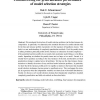Free Online Productivity Tools
i2Speak
i2Symbol
i2OCR
iTex2Img
iWeb2Print
iWeb2Shot
i2Type
iPdf2Split
iPdf2Merge
i2Bopomofo
i2Arabic
i2Style
i2Image
i2PDF
iLatex2Rtf
Sci2ools
101
click to vote
ICML
1997
IEEE
1997
IEEE
Characterizing the generalization performance of model selection strategies
Abstract: We investigate the structure of model selection problems via the bias/variance decomposition. In particular, we characterize the essential structure of a model selection task by the bias and variance profiles it generates over the sequence of hypothesis classes. This leads to a new understanding of complexity-penalization methods: First, the penalty terms in effect postulate a particular profile for the variances as a function of model complexity-if the postulated and true profiles do not match, then systematic under-fitting or over-fitting results, depending on whether the penalty terms are too large or too small. Second, it is usually best to penalize according to the true variances of the task, and therefore no fixed penalization strategy is optimal across all problems. We then use this bias/variance characterization to identify the notion of easy and hard model selection problems. In particular, we show that if the variance profile grows too rapidly in relation to the bia...
Hard Model Selection | ICML 1997 | Machine Learning | Model Selection Problems | Model Selection Task |
Related Content
| Added | 17 Nov 2009 |
| Updated | 17 Nov 2009 |
| Type | Conference |
| Year | 1997 |
| Where | ICML |
| Authors | Dale Schuurmans, Lyle H. Ungar, Dean P. Foster |
Comments (0)

